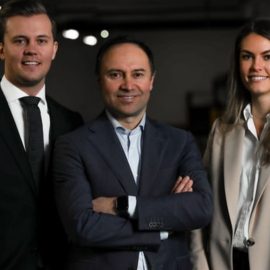

This article is an excerpt from the Shortform summary of "The Smartest Guys in the Room" by Bethany McLean and Peter Elkind. Shortform has the world's best summaries of books you should be reading.
Like this article? Sign up for a free trial here .
What was Enron Online, and how did it contribute to Enron’s failure in 2001?
Enron Online was one of Enron’s failed business plans. Enron Online was a virtual trading platform for energy futures. This branch of the business didn’t work out for several reasons we’ll cover here, and Enron Online became another liability.
Enron Online: Energy Traders Take Bigger Risks
Meanwhile, the energy traders were making lots of money in the volatile markets. They were one of the few really profitable centers of the company, giving credence to Skilling’s vision of a next-generation, asset-light energy company.
In the early inefficient markets, traders used fundamental research to make smart trades – like finding dam water levels to estimate future water prices or using weather to estimate fuel prices. Money came so easily they were bewildered.
They made even more when they launched Enron Online – a virtual trading floor for energy futures.
- Enron served as the marketmaker, representing both sides of the trades. This dramatically increased the capital requirements (the danger will become apparent later).
- Its dominant position, as well as proprietary info on what outside traders were doing on their platform, allowed Enron to possibly manipulate markets to move prices in its favor. Enron supposedly did 25-50% of the trades in gas futures and electricity.
- They justified manipulating prices as just mere supply and demand – “traders don’t determine long-term price. No one had to use EOL – it wasn’t their fault others couldn’t come up with anything better.”
Within Enron, the traders saw themselves as the intellectual elite and the salvation of the company, since they were actually making money.
Enron Trading
In addition to Enron Online, their hubris in energy trading led them to launch trading ventures in a host of other commodities – steel, paper, lumber, metals, bandwidth (such as Enron Broadband, see below). Skilling thought Enron could be the market maker for everything! None of the others launched to much success. They thought Enro Oonline was sure to be a success.
They continued taking progressively riskier positions, breaking the trading limits.
As always, mark-to-market became a risk – they made their books look better through optimistic projections.
Long-term trades wouldn’t deliver cashflow immediately. So despite being one of the few profitable centers, the trading floor also became dependent on Fastow’s deals.
In 2001, Enron took a large short position on electricity (forecasting lower energy prices and less volatility due to the weakening economy and conservation).
Enron Broadband
In 1999, Internet stocks were overheated. Put “broadband” in your company somewhere, and the stock price would rise without tying to fundamentals. Enron Broadband was a failed venture that happened alongside Enron Online.
- Skilling calculated that every $1 invested in broadband would pay back $20 in market capitalization.
Skilling promised such large returns that the division was strongly pressured to make deals happen. They burnt a lot of money ($500MM a year) trying to find a valuable business plan.
The larger vision was that broadband might ultimately become a tradable commodity, like natural gas or oil. But this vision failed to meet reality:
- Physical technicalities got in the way. Internet lines were set up so sharing bandwidth wasn’t possible. In one sense, internet pipes were parallel pipes that never intersected.
- Enron promised that it was inventing new routing technology that would enable bandwidth sharing, but this never made it out of the lab.
- Meanwhile, the incumbent telephone companies were uninterested in hooking into Enron’s market. This would turn bandwidth into a commodity that would cut into their control of markets.
Enron even began partnering with Blockbuster to build content streaming services. Its rosy projections made napkin-calculations on how many cities they would enter, the market share they’d have, and the # of movies users would buy. In classic Enron fashion, it booked $110 million in profits from this deal immediately, before anything had materialized.
The reality of executing on content streaming was difficult. The content owners had massive leverage and were wary of entering a distribution medium they couldn’t control. Streaming from the Internet to the TV required expensive special boxes. And incumbent DSL providers controlled access to the last mile and were tough in negotiations.
The trials were tiny – 300 households involved – and the ultimate real sales from this were laughable, in the dozens of dollars. An Enron executive handed the business manager $5 and said “there, I doubled your revenue.” Enron Broadband looked to take part in the same schemes as Enrononline.
The deal fell apart months after announcement, with Enron claiming Blockbuster hadn’t lined up content providers like promised.
Even though the failed deal should have been written down as a loss, Enron reasoned that it should actually be a gain – Enron would no longer have to share the proceeds!
Unfortunately, both Enron Energy Services and Enron Broadband bets were off the mark, which affected Enron Online. Enron spent billions on unprofitable projects. This put Enron in an impossible position – having spent all that money and raised expectations, there was no room for failure. They could only hide the massive losses through more machinations.
Enron Online was another failed branch of the Enron business. However, the failure of Enron Online didn’t stop Enron from continuing as if they’d made a profit.

———End of Preview———
Like what you just read? Read the rest of the world's best summary of Bethany McLean and Peter Elkind's "The Smartest Guys in the Room" at Shortform .
Here's what you'll find in our full The Smartest Guys in the Room summary :
- How Enron rose to become one of the world's most promising companies
- How Enron management's greed led it to start cutting corners
- The critical failures that crashed Enron's house of cards to the ground





